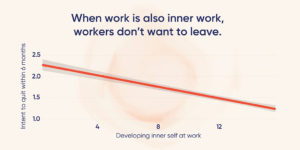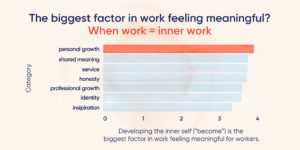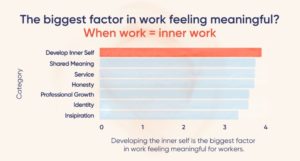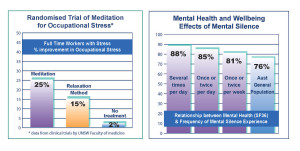Why Inner Work Is the Ultimate Retention Strategy by Kasey Fleisher Hickey
The world of work is changing at a dramatic pace for both employers and employees. To keep up, we must reimagine what the future of work looks like. But this reimagining exercise involves thinking outside the box, and exploring how our experiences as human beings (and not just employees) affect our outlook, engagement in our work, and ability to innovate.
Recently, our team of researchers conducted a rigorous study, surveying a group of 3,000+ working individuals about their inner work(defined as “mental acts or activities focused in your inner world to achieve a purpose or result”) and self-care habits. BetterUp behavioral data scientist Andrew Reece, a Harvard PhD whose expertise lies in using machine learning and statistics to gain new insights into human psychology and decision-making, poured over hundreds of pages of research in organizational and behavioral science to come up with a framework for understanding what is inner work? And how does it manifest across the American workforce?
We asked survey respondents, “On average, how many days per week do you take time to do the following activities?” Respondents reported doing each activity between 0-7 days per week.
Our survey uncovered some fascinating insights, both from an individual and organizational perspective.
Geographic impact on inner work activities
At a high level, we discovered that inner work is dictated not only by who we are, but where we live. For example, we found out that:
- The #1 inner work activity in Alabama was prayer (3.06 prayer breaks per week)
- The #1 inner work activity in Hawaii was meditation (1.44 meditation breaks per week).
- Idaho is #1 for walking (4.18 walking breaks per week).
- Reading ranked #1 in Mississippi (3.13 reading breaks per week).
- Journaling, is #1 in New Mexico (1.13 journaling breaks per week)
These findings were interesting, for sure, and had our team comparing notes on how we practice inner work. But as it turned out, there were even more mind-blowing correlations between inner work and both organizational and personal outcomes, including:

- Inner work is positively correlated with subjective levels of happiness
- Our survey found a positive correlation between inner work breaks and employee promotions
Speaking at Shift, our conference on the topic of reimagining meaning at work, our CEO said, “Inner work is the ultimate retention strategy.” Not only is inner work positively correlated with individual happiness and professional growth, but our team’s research has shown that it contributes to increased engagement and retention.
What does this mean to employers? Investing in people — as human beings — isn’t just something that sounds good. It has undeniable consequences on culture and the bottom line.
Check out all of our findings from this survey,
See this entire article at https://www.linkedin.com/pulse/why-inner-work-ultimate-retention-strategy-kasey-fleisher-hickey/?trk=eml-email_feed_ecosystem_digest_01-recommended_articles-14-Unknown&midToken=AQHpITWdCTZzRQ&fromEmail=fromEmail&ut=3F-L6nN0T3oE81



